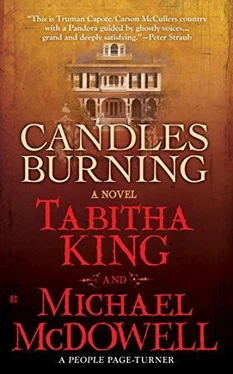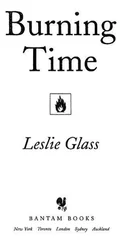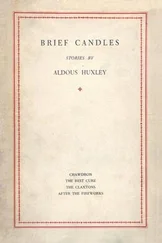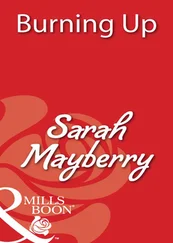On the wall behind his desk, there were several pictures of Captain Senior, all of them with men and guns and dogs, and none with Mamadee. The wedding photograph of the two of them was in the foyer, and the big one of Mamadee in her wedding dress was on the Chickering.
A 1913 Victrola with a plaque inside declaring that it was a Victor Talking Machine stood next to Captain Senior’s favorite leather chair—still, after all these years, imprinted with the shape of his buttocks. As a smaller child, I had busted my lip several times trying to turn the crank to make the turntable of the Victrola turn. Like Daddy’s coffin, the Victrola—or rather its cabinet—was mahogany, which I knew because Mamadee and her maid, Tansy, had warned me more than once not to scratch it.
In the cupboard part of it, there were big old heavy records. Nobody seemed to mind if I scratched them . I had been playing with them since I was no more than a baby. They were heavy and sharp-edged. When I was too small to carry them, I had picked one up and dropped it on my toes. I still remember how entirely purple all my small toes became.
The 78s sounded as if they had been recorded at the bottom of the sea, and were wonderfully punctuated.
Poppetyshushshushpopshush
Though later I realized that Captain Senior’s musical taste was pedestrian, at the time, the 78s provided lovely noise to me. “Alabama Jubilee,” “Hard Hearted Hannah,” “Red River Valley,” “Down Yonder,” “The Tennessee Waltz” and “Good-night, Irene” are some that I recall.
On one side of the fireplace was Captain Senior’s Westinghouse Superheterodyne radio. It still worked just fine. There was no television set in the room or anywhere in Ramparts. Mamadee thought television was a passing fad, like 3-D movies. From the way she used to skirt the console at our house in Montgomery, I suspected that she was afraid of it.
I got as far as the library and had the cupboard open to take out some records when Mamadee stuck her head in the door and said, “Calley, you are bound and determined to scratch that cabinet. Go on upstairs and unpack.”
We visited often enough to have our own regular rooms. Mama’s room went back to her girlhood. Daddy used to make little jokes to Mama about the bed whenever we came to visit. Mamadee altered nothing in the room after Mama married Daddy, requiring my parents to sleep in Mama’s old bed. Fortunately it was at least a full bed. Crowded, Daddy used to say, but cozy.
To me, the most interesting thing in Mama’s room was the curling color snapshot of her that was stuck in the frame of the vanity mirror. In it, she wore a sleeveless blouse and the wide knee-length shorts of the forties. She sat on the verandah railing back against a pilaster, hugging her knees.
Her hair was parted in the middle and curled back and away in that forties’ hairstyle that I have never figured out. Not that I could have done it with my hair. I knew that this was how Mama looked when she met Daddy.
Ford’s room had been Mama’s younger brother’s—the junior Robert Carroll. Balsa wood airplanes hung from the ceiling and a framed copy of “Invictus” hung over the desk. A small bookcase was crowded with boys’ adventure stories full of Toms and Joes and Franks and Dicks and goshes and gollies and gee willikers. I vaguely recall banners on the walls and a diploma of some kind hung with a gilded tassel.
Another bedroom, furnished with twin beds, had belonged to Mama’s older sisters, Faith and Hope. I only knew it because Mama said so, just once. I had an idea that they were either in jail, which was the worst place I knew of short of hell itself, or they were dead. Portraits, photographs and snapshots of Junior were here, there, and everywhere at Ramparts, but I cannot remember so much as a curling snapshot of Faith or Hope. I might have slept in that room, except the beds were never made up, the rugs were rolled up against the walls, and dustcovers shrouded every object. The woodwork of the door frame in the hallway was curiously pitted with nail holes. I concluded that at some time the room had actually been boarded up. It would not have surprised me if it had been, and Faith and Hope left to starve to death within, as punishment for some perceived defiance of Mamadee. Possibly a scratch on the mahogany of the Victrola.
The room I was accustomed to using was up a short flight of stairs from the others, under the eaves. Once a servant’s room, the narrow meager space had been taken over at some time by Junior, who may never have actually slept in it. The greater height in the house of that room must have offered better reception for his radios. The room accommodated a single bed of brown-enameled iron, a dresser with a Bakelite radio on it, and a wooden chair and desk that had seen some hard days. On the desk was a shortwave radio, a spill of pamphlets and old books about ham radio, and a suitcase record player. From the rod in the small closet hung a net bag of mothballs. On the bottom of the closet floor was a wooden orange crate of records, the cardboard sleeves all marked with the name Bob Carroll Jr.
The crate of records was better than pirate gold to me. The records were all far more recently pressed than Captain Senior’s; many of the songs could still be heard on the radio. The box contained recordings by Charlie Parker, Count Basie, Duke Ellington and Dizzy Gillespie, and more, hits (as they were called on the radio shows) like “Don’t Sit Under the Apple Tree,” “Swinging on a Star,” “Rum and Coca-Cola,” “Sentimental Journey.”
Among the records, I kept a rusty chisel, stolen from a toolbox in the barn, in case Mamadee boarded up the room while I was in it. I was big enough now to get out the window, so I probably wouldn’t ever need it, but I left it as a courtesy to any other kid Mamadee might board up in the room in future.
Under the iron bed was an old stained china pot with a cracked lid. Over the bed, a few dusty books, with Robert Carroll Jr. inscribed in them, held each other up on a homemade wooden shelf. One was Peterson’s A Field Guide to the Birds of Eastern and Central North America . It was a first edition, published in 1934, not that first edition meant doodly to me then. Another was Birds of North America , also dated 1934, with 106 full-color plates of Louis Agassiz Fuertes’s paintings. It was a Bible-heavy old book, which for me added to its authority. Hall’s North American Trees: Guide was easier to take off the shelf without braining myself. The third bird book was the most recent, a 1946 Audubon Bird Guide: Eastern Land Birds , by Richard Pough. It had green binding and a comfortable fit to the hand. There were three or four others, all pertaining to the natural world, and in their margins, someone had written notes in a script faded to illegibility. I had been looking at those books since I was old enough to reach the shelf and before I could read. Fortunately, Mamadee never came near this room, so I did not have to worry about her catching me with the books and taking them away, which she surely would have for fear that I might enjoy them.
Once I had overheard Mamadee remarking to one of the women with whom she played Bridge, that when her Bobby died, it killed Captain Carroll too, sure as God Made Little Green Apples. I reckoned that meant Captain Senior grieved himself to death, a common fate of the bereaved in Alabama. I had to wonder now that Daddy was dead—if he really was—if I could grieve myself to death.
Almost outside the window, one of the old oaks whispered and creaked, and in it, the birds and the squirrels and chipmunks carried on their daily lives.
Mamadee’s yardman, Leonard, had placed my suitcase on the bed, my record player on the floor and my Betsy Cane McCall doll and box of paper dolls on the bed. He had opened the window a few inches to air out the room; now it was chilly. I flung my coat on the bed, opened my suitcase and one of the dresser drawers, threw the contents of the first into the second, and slammed them both shut. I slid the suitcase under the bed next to the pot. That left the doll and my paper dolls. I lifted the box top and looked down into it. Betsy McCall Was Still In Pieces. At Ramparts.
Читать дальше












